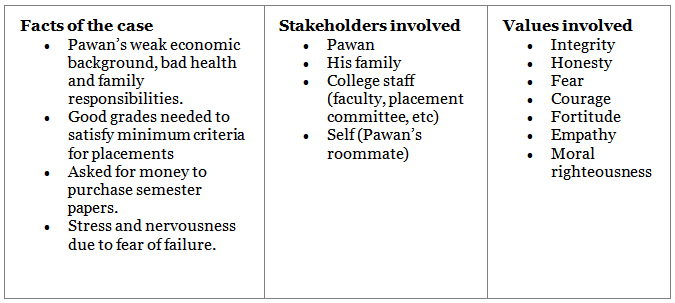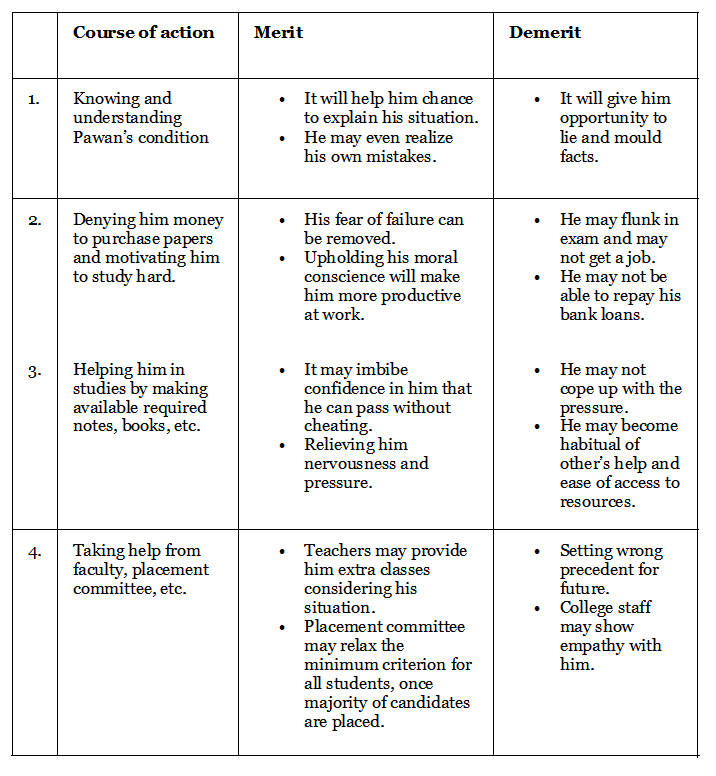Ethics: August 2022 Current Affairs - UPSC PDF Download
What is meant by conflict of interest? Illustrate with examples, the difference between the actual and potential conflicts of interest.
Answer: A conflict of interest occurs when an individual’s personal interests – family, friendships, financial, or social factors – could compromise his or her judgment, decisions, or actions in the workplace. Government agencies take conflicts of interest so seriously that they are regulated. A conflict of interest is a situation in which an individual has competing interests or loyalties. A conflict of interest can exist in many different situations.
E.g. with a public official whose personal interests conflict with his/her professional position (Chanda Kochhar case), with a person who has a position of authority in one organization that conflicts with his or her interests in another organization, with a person who has conflicting responsibilities. In our work lives, we also have interests that could influence the way we do our jobs and the decisions we make. Even if we never act on them, there may be an appearance that a conflict of interest has influenced our decisions. Consider this example. Your supervisor is promoted to department director. His daughter-inlaw is hired as a new supervisor within the college but is not reporting to him. Maybe the new supervisor is the best candidate for that position, and maybe the new department director had nothing to do with her hire. Even if this hire met all of the requirements under our Employment of Relatives policy, the situation appears suspicious and employees may think that something was unfair or unethical about her hire.
The difference between the actual and potential conflict of interest:
- An actual conflict of interest involves a direct conflict between a public official’s current duties and responsibilities and existing private interests.
- A potential conflict of interest arises where a public official has private interests that could conflict with their official duties in the future.
- An actual Conflict of Interest arises in a situation where financial or other personal or professional considerations compromise an individual’s objectivity, professional judgment, professional integrity, and/ or ability to perform his or her responsibilities.
- Potential Conflicts of Interest exist in situations where an individual member of the community, a member of the individual’s family, or a close personal relation has financial interests, personal relationships, or professional associations with an outside individual or organization, such that his or her activities within the organisation could appear to be biased against the organisation by that interest or relationship.
Example: A civil servant awarding public-contract to a firm owned by his/her relatives is a case of actual conflict of interest. Whereas, according to civil services rules, a civil servant should not be posted in his/her native district is to avoid any potential conflict of interest. Similarly, the Delhi High Court verdict which quashed the appointment of 21 Delhi MLAs as secretaries to ministers was to avoid any potential conflict of Interest. While, an MLA having peculiar benefits from some other Office of Profit is illegal as it is actual conflict of interest.
Case Study - 1
You are the team lead in a project. Your junior Mr. A, in the team is an extremely hard working and a productive individual who always completes his assignments on time. However of late, it has been brought to your notice that Mr. A has been misbehaving with Mrs. x who is a junior to him in the team. Mrs. x approaches you and apprises you of her uncomfortable situation in the team. According to her, Mr. A has been making advances towards her in the wrong way and on occasions has even asked her out for dinner which she disapproved of. Mrs. x demands immediate action against Mr. A. How will you proceed and what actions will you take to resolve the crisis?
Solution
- The situation is one of alleged sexual harassment at the workplace which, if proved true, will portray the company in poor light, thereby affecting its credibility and profitability in the long run. A sense of insecurity might creep in among other female employees of the companies, thus hampering the team spirit.
- An independent panel must be immediately set up having women members on its board to probe the allegations impartially. Guidelines regarding the same has been laid down by the Supreme Court in Vishakha case. In order to ease the situation, Mrs. x should be transferred from Mr. A’s team citing reasons like team restructuring.
- Since Mr. A is a competent employee, therefore, unless proven guilty one cannot initiate serious penal measures against him. However, while the investigation process, Mr. A can be asked to stay (after speaking to him on the same) on leave as a cautionary measure.
- One can also inquire at personal level to find about the behavioral pattern of Mr. A from other female employees of the company. If the investigation committee finds Mr. A as guilty, one should immediately terminate him and not to be much concerned about his skills and efficiency as excellence and productively can be easily bought in the market, but not the credibility. Besides respecting women is a cardinal principle on which no compromise is thinkable.
- However, if the charges are proved wrong, one should immediately reinstate Mr. A and apologize personally to him. Also penal actions should be taken against Mrs. X. In the long run one should get CCTV cameras installed at the workplace and even appoint women group leaders in the team so as to send a strong message to women in the organization that gender is no bar to being promoted. One can also send a note to the company to organise gender sensitisation camps to build awareness about female rights among other employees.
Case Study- 2
Pawan is pursuing MBA and shares a room with you in the private hostel. He desperately needs a job after completing his course because of educational loan and weak economic background. In his last two semesters, he couldn’t secure good grades due to serious illness. In current semester he has to secure good marks at any cost to satisfy minimum criteria for placements.
Few days before the final semester exam, he comes to you and asks for money. He is stressed and nervous. He tells you about his plan to purchase semester papers to clear the exam and convinces you for the same by giving reference to his bad health, family status and his education loan.
In such circumstances, would it be right to lend money to him?
(a) Identify the moral dilemma faced by you.
(b) Analyse your role and duties as a friend, also suggest your course of action.
Solution
The given case tests the ability of a person to stick to the right means even in difficult circumstances in life. One needs to balance his role as a true friend by making Pawan realize his mistake and simultaneously helping him in other ways.
(a) Moral dilemmas faced:
- Means v/s Ends: Taking incorrect means of giving Pawan the money to buy the semester papers to attain the ends of getting good grades which would allow him to sit for placements.
- Social obligation v/s moral righteousness: Supporting one’s friend in need or adhering to one’s conscience by not giving him money.
(b) Roles and duties as a friend:
- A true friend is one who shows the right path. He is one who not only tells ‘what is’ rather ‘what ought to be’. Hence, he is a true friend, philosopher and guide for lifetime.
- He shows the emotional support, empathy, trust, and mutual cooperation in the hardest of times.
- He encourages and motivates others and imbibes confidence in them so that the hidden talent and capabilities can be revived.

Conclusion
- As suggested by Gandhiji, we always have control over the means but not over the end. As quoted in his book ‘Hind Swaraj’, “one should not expect rose flowers by sowing the seeds of Babool.” Hence, Pawan should adhere to the correct means by not cheating for the sake of passing the exam.
- Also, one can only expect short term gains by following incorrect means. But in the long run, it is always one’s righteousness, ideal conduct, and truth which lead to a successful life.
- Hence, Pawan should be made to realize that excellence is a way of life and in his long career ahead, it will always be his ‘ethical conduct’ which would allow him to steer the path towards success.
Case Study - 3
You are a District Collector of a city which is scheduled to go to polls in a week. The responsibility to conduct fair elections has been given to you. However, suddenly your mother suffers a heart attack and has to be admitted to a hospital in your home district, which is at a distance of 250 kms from the district of your posting. Doctor informs you that she needs to be shifted in Intensive Care Unit (ICU) and her chances of survival are bleak. You are the only child and want to be with her and your family at this moment. Your plea for an emergency leave has been rejected by the Election Commission. What would you do under such circumstances?
Solution
- I have been presented with an ethical dilemma of choosing between personal and administrative responsibilities. Under the given circumstances, both of them demand my immediate personal attention. I will try to deal with the situation in the following manner:
- I will visit my mother immediately after work and then try to come back the very same day. I will ask the doctor to keep me updated about my mother’s health. I shall communicate the same to my seniors in the government and request a medical attendant to my mother. Since the distance of the hospital is only 250 kms, I will try to pay a visit to my mother during the lean phases of electoral preparation by taking due permission from election commission. In my absence to ensure that the elections are conducted peacefully, I’ll take the following steps:
- I will keep the election commission informed of my absence from city after office hours.
- I will ensure that my subordinates and colleagues are aware of their duties and work so that even in my absence, polls preparation and execution does not suffer.
- I will keep only selected colleagues informed of my absence from the city so that the general assumption keeps prevailing that the district collector is in the city.
- I will always be in constant touch with all the concerned authorities and stakeholders.
- While at work I will try to be in touch with my mother so as to make her feel comfortable. During the telephonic conversation will try to comfort her that she would be well soon and also assure her that after the elections I will spend more time with her. I will try to use technological tools like Skype for video chatting with her on Internet so that she feels better. I will also request the best doctors in the district to examine my mother’s case and ensure that she receives the best medical attention and care.
To know more information














